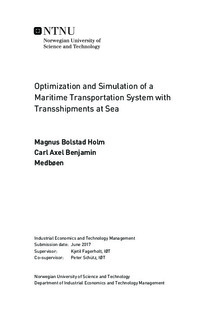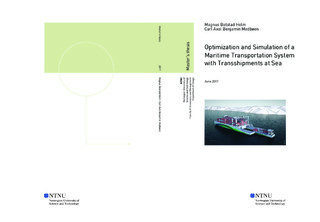| dc.description.abstract | This Master's thesis presents an operations research study of the Short Sea Pioneer logistics system which is a conceptual maritime logistics system between continental Europe and the Norwegian coastline. The aim is to make short sea shipping more cost efficient and attractive by having transshipments at sea between mother and daughter ships.
Few guidelines regarding system designed are determined, and this Master's thesis presents a modeling framework to establish a deeper understanding of how the concept might be realized. The framework combines an optimization and a simulation model in order to find a fleet deployment plan and a liner shipping network configuration taking weather uncertainty into account.
The optimization model includes a route generation procedure and a master problem. A path flow formulation is chosen and candidate routes are generated using an a-priori dynamic programming label-setting algorithm. A solution from the optimization model is a route composition consisting of one main route and one or more daughter routes. The objective is to minimize operational costs while ensuring that all ports are visited weekly.
The simulation model is implemented to evaluate the performance of a solution under realistic weather conditions. If a solution cannot maintain a weekly port visit frequency, a penalty cost is assigned. An iterative feedback process between the optimization and the simulation model is implemented and referred to as the solution triggered feedback approach. The output from the simulation model is sent back to the master problem enabling it to find better solutions. The result is a solution that performs well taking both operational cost and behavior under realistic weather conditions into consideration.
Several performance-improving strategies are implemented to find solutions that perform well under realistic weather conditions. In addition, a simplified simulation approach without any iterations between the master problem and the simulation model is used as a benchmark to discuss the value of the solution triggered feedback approach.
The results show that solutions found using the optimization model alone perform poorly when simulated. However, when using performance-improving strategies, the obtained solutions perform significantly better. In addition, the solution triggered feedback approach seems to find better solutions than the simplistic approach.
The findings in this Master's thesis can be used as decision support in the development of the Short Sea Pioneer logistics system. Since the system is in a conceptual phase, different input parameters can be tested to see how the results are affected. By doing this, a decision maker can use their experience and expert judgment to evaluate the Short Sea Pioneer logistics system in a broader context. | |

